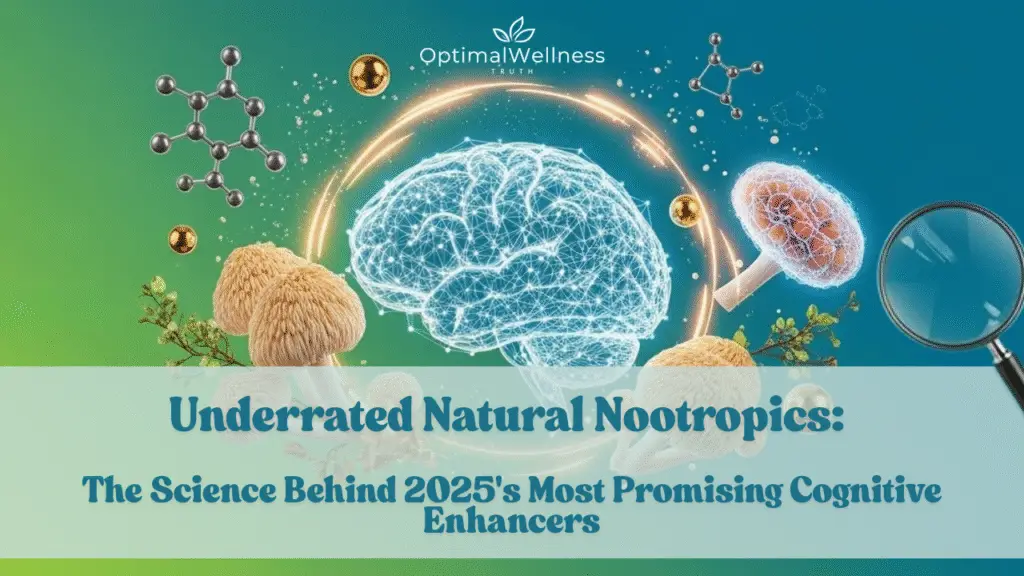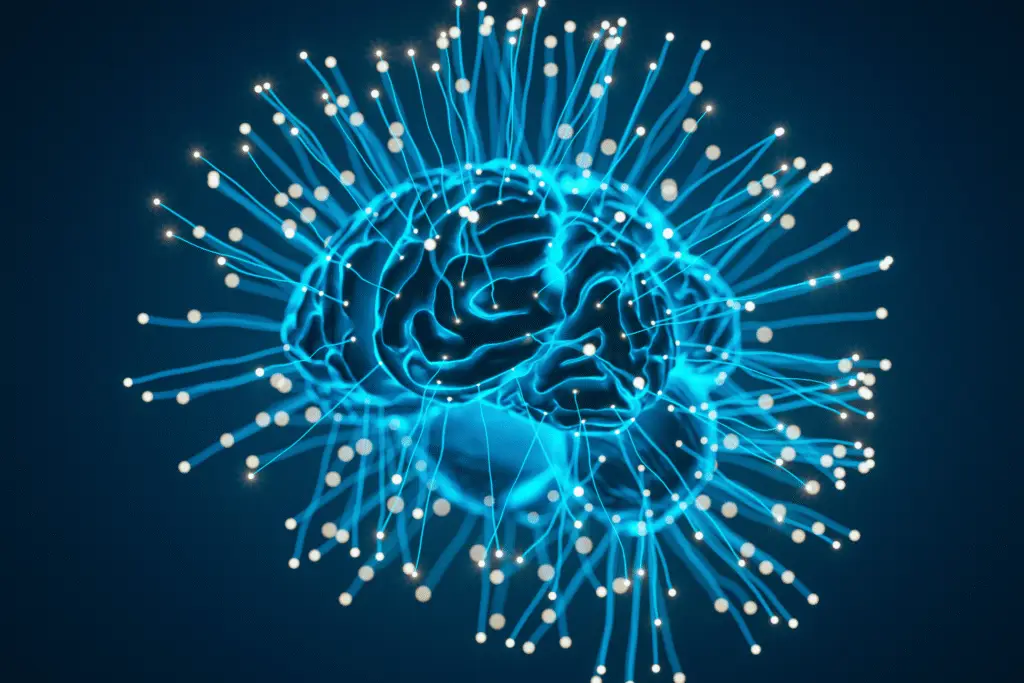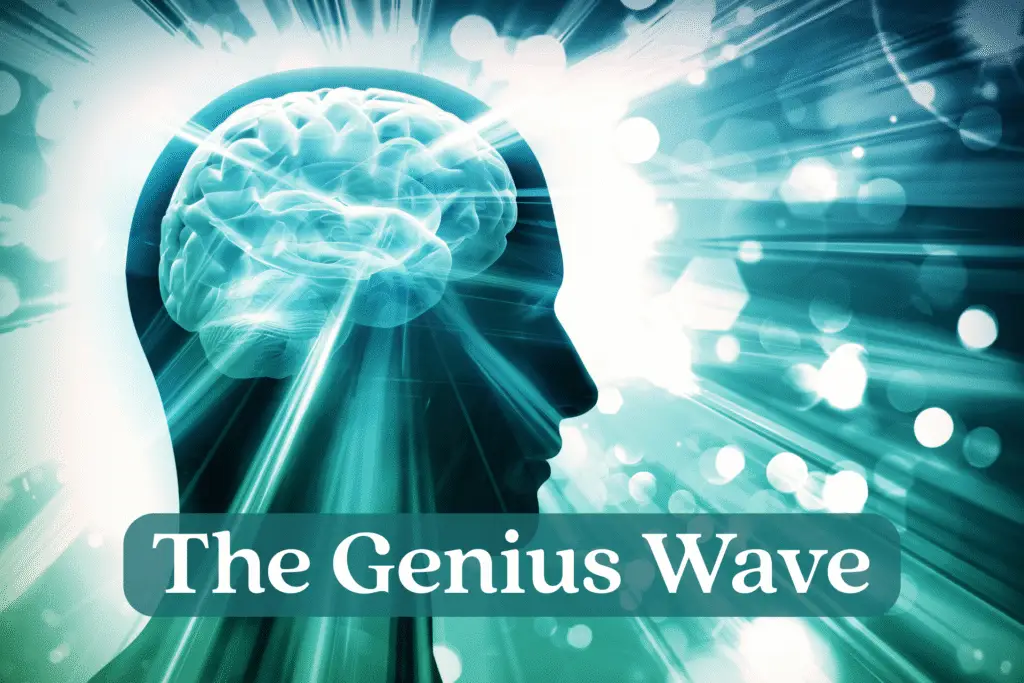Underrated Natural Nootropics: The Science Behind 2025’s Most Promising Cognitive Enhancers
Discover science-backed natural nootropics that enhance brain function without the hype. Research-based cognitive enhancers that improve memory, focus, and mental clarity in 2025.
Table of Contents
Introduction
The cognitive enhancement market is experiencing unprecedented growth, with projections showing the global nootropics market expanding from $5.23 billion in 2024 to $6.01 billion in 2025—a remarkable 14.8% compound annual growth rate. However, amidst this surge, many popular nootropic supplements are heavily marketed with inflated claims and insufficient scientific backing, leaving consumers confused about what actually works.
While mainstream cognitive enhancers dominate headlines and marketing budgets, a compelling collection of underrated natural nootropics has been quietly building robust scientific evidence. These overlooked compounds offer legitimate cognitive benefits backed by rigorous research, yet they remain overshadowed by flashier, less substantiated alternatives.
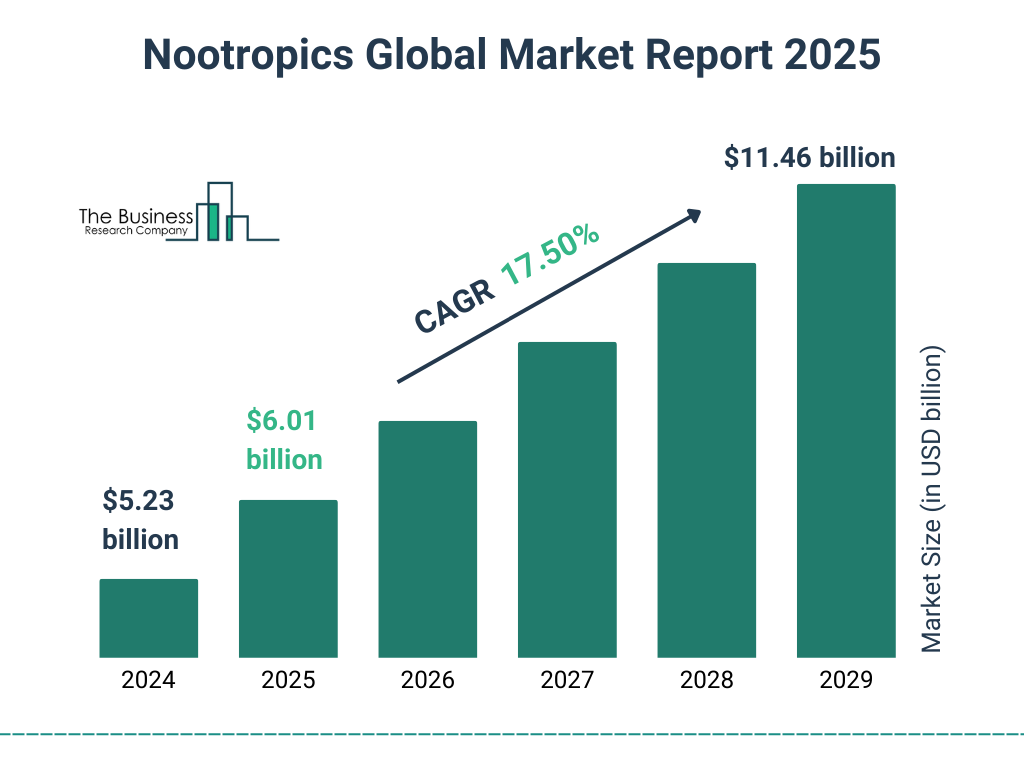
Nootropics market expanding. Source: The Business Research Company
Key Benefits of Evidence-Based Natural Nootropics
- Enhanced memory consolidation and recall
- Improved focus and mental clarity
- Reduced brain fog and cognitive fatigue
- Long-term neuroprotective effects
- Sustainable cognitive enhancement without tolerance
Recent breakthrough studies have revealed fascinating insights into how these natural compounds interact with neural pathways, influence neurotransmitter systems, and support cellular energy production in the brain. From creatine’s surprising role in cognitive energy metabolism to mushroom-derived compounds that stimulate nerve growth factors, the latest research is reshaping our understanding of natural cognitive enhancement.
The Advancement of Natural Nootropics Science
Evolution of Cognitive Enhancement Research (2020-2025)
The landscape of cognitive enhancement research has undergone a dramatic transformation over the past five years. While early nootropic studies focused primarily on pharmaceutical compounds and synthetic derivatives, the research paradigm has shifted decisively toward natural compounds with established safety profiles and documented traditional use.
This evolution reflects growing recognition that sustainable cognitive enhancement requires a nuanced understanding of brain physiology and the complex interplay between nutrition, neurochemistry, and cognitive function. Modern research methodologies now employ advanced neuroimaging techniques, sophisticated cognitive testing batteries, and biomarker analysis to provide unprecedented insights into how natural compounds influence brain function.
Distinguishing Traditional Supplements from Emerging Nootropics
Traditional cognitive supplements often relied on broad claims about brain health without specific mechanisms of action or targeted cognitive outcomes. In contrast, emerging natural nootropics are characterized by well-defined mechanisms, measurable effects on specific cognitive domains, and reproducible results across multiple research populations.
Characteristics of New Generation Natural Nootropics:
- Cross the blood-brain barrier effectively
- Target specific neural pathways
- Provide measurable cognitive improvements within defined timeframes
- Maintain efficacy with long-term use without tolerance development
Scientific Criteria for Evaluating Natural Nootropic Efficacy
Contemporary research applies rigorous criteria to evaluate natural nootropic effectiveness. These standards include demonstrable bioavailability, measurable impact on cognitive testing metrics, neuroimaging evidence of brain activity changes, and replication of results across independent research groups.
The most compelling natural nootropics of 2025 satisfy multiple evaluation criteria: they show consistent effects across diverse populations, demonstrate dose-dependent responses, maintain safety profiles through extended use, and provide mechanistic explanations for their cognitive benefits.
Creatine Monohydrate – Beyond Muscle, Benefiting the Brain
Emerging Science of Creatine for Cognitive Health
Revolutionary 2024 research has fundamentally altered our understanding of creatine’s role in cognitive function. A groundbreaking study published in Scientific Reports demonstrated that a single high dose of creatine significantly improved cognitive performance and processing speed during sleep deprivation, while simultaneously inducing measurable changes in brain energy metabolism.
The study revealed that creatine supplementation increased phosphocreatine-to-phosphate ratios, elevated ATP levels, and enhanced total creatine-to-N-acetylaspartate ratios in the brain. These findings provide direct evidence that creatine supplementation can rapidly optimize brain energy metabolism under cognitive stress conditions.

Creatine Mechanism in the Brain. Source: ResearchGate (2024)
Neurobiological Mechanisms: How Creatine Enhances Brain Function
Creatine’s cognitive benefits stem from its fundamental role in cellular energy metabolism. The brain consumes approximately 20% of the body’s total energy despite representing only 2% of body weight, making energy availability a critical factor in cognitive performance.
Key Mechanisms of Creatine in Brain Function:
- Energy Buffer System: Instantly regenerates ATP during high-demand cognitive tasks
- Mitochondrial Support: Enhances cellular energy production efficiency
- Neuroprotection: Reduces oxidative stress and supports cellular resilience
- Enhanced Neurotransmission: Supports optimal neural communication
Specific Benefits for Memory, Reasoning, and Processing Speed
Clinical studies consistently demonstrate creatine’s effectiveness across multiple cognitive domains. Memory improvements are particularly notable, with research showing enhanced working memory capacity, improved long-term memory consolidation, and better memory recall under stressful conditions.
Processing speed benefits are especially pronounced in tasks requiring rapid decision-making or sustained attention. The 2024 sleep deprivation study found that creatine supplementation maintained normal processing speeds even after 24 hours without sleep, suggesting significant protective effects against cognitive fatigue.
Dosage Protocols and Special Populations
Cognitive Enhancement Dosing:
- Daily maintenance: 3-5g
- Acute cognitive support: 20g single dose
- Best taken with meals
- Benefits apparent within 1-2 weeks
Populations with Enhanced Benefits:
- Vegetarians and vegans
- Adults over 50
- Sleep-deprived individuals
- High cognitive demand professions
Functional Mushrooms – The New Frontier in Neuroprotection
.webp)
Functional Mushrooms Cognitive Market. Source: Fortune Business Insights
Lion’s Mane (Hericium erinaceus)
Lion’s Mane mushroom has emerged as one of the most scientifically compelling natural nootropics, with 2024-2025 research revealing unprecedented insights into its neuroplasticity-enhancing mechanisms. The mushroom’s bioactive compounds, including hericenones and erinacines, demonstrate remarkable ability to stimulate nerve growth factor (NGF) and brain-derived neurotrophic factor (BDNF) production.
Key Bioactive Compounds:
- Hericenones (stimulate NGF synthesis)
- Erinacines (cross blood-brain barrier)
- Beta-glucans (immune support)
- Potassium, zinc, selenium
Cognitive Benefits:
- Enhanced neuroplasticity
- Improved memory formation
- Better learning capacity
- Neuroprotective effects
A comprehensive 2024 study examining Lion’s Mane’s acute and chronic effects found that while single doses showed minimal immediate cognitive impact, chronic supplementation over 16 weeks produced meaningful improvements in mild cognitive impairment scores among adults aged 50-80 years.
Reishi (Ganoderma lucidum)
Reishi mushroom’s cognitive benefits operate through sophisticated anti-inflammatory and adaptogenic mechanisms that indirectly but powerfully support brain function. The mushroom’s triterpenes and polysaccharides demonstrate potent anti-inflammatory effects in neural tissue, reducing neuroinflammation that contributes to cognitive decline and brain fog.
Reishi’s Sleep-Cognition Connection
The relationship between Reishi supplementation and sleep quality represents one of its most valuable cognitive benefits. High-quality sleep is fundamental to:
- Memory consolidation processes
- Cognitive restoration and detoxification
- Optimal daytime cognitive performance
- Neurotransmitter balance restoration
Cordyceps and Other Emerging Mushrooms
Cordyceps militaris has gained attention for its unique effects on cellular energy production and mental stamina. Unlike stimulants that provide temporary energy boosts followed by crashes, Cordyceps appears to enhance mitochondrial function at the cellular level, providing sustained mental energy and cognitive endurance.
Preliminary research suggests that Cordyceps supplementation may improve oxygen utilization in brain tissue, potentially enhancing cognitive performance during mentally demanding tasks or high-altitude conditions. While research is still emerging, early studies indicate promising applications for sustained cognitive performance and mental fatigue resistance.
Magnesium L-Threonate – The Mineral That Crosses the Blood-Brain Barrier
The Revolutionary Form of Magnesium for the Brain
Magnesium L-threonate represents a significant breakthrough in mineral supplementation, offering unprecedented bioavailability to brain tissue. Unlike conventional magnesium forms that struggle to cross the blood-brain barrier, magnesium L-threonate was specifically designed to enhance magnesium delivery to neural tissue.
This chelated form combines magnesium with L-threonic acid, a vitamin C metabolite that facilitates transport across the blood-brain barrier. Research demonstrates that magnesium L-threonate increases brain magnesium levels by 15-20%, compared to minimal increases observed with other magnesium forms.
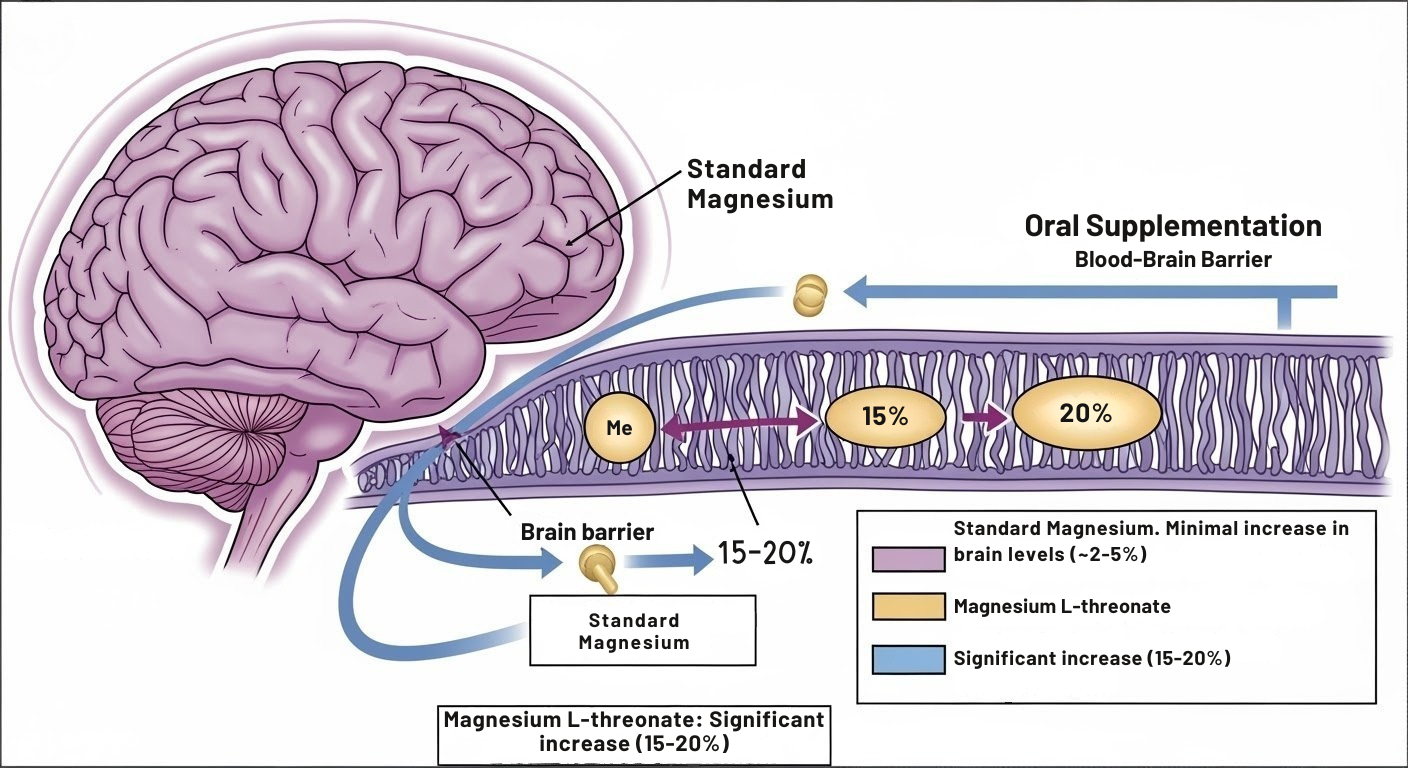
Benefits for Memory and Learning
Magnesium L-threonate’s memory-enhancing effects operate through multiple mechanisms involving synaptic plasticity and neural communication. Research demonstrates that optimal brain magnesium levels support enhanced synaptic density, improved long-term potentiation, and more efficient memory consolidation processes.
Working Memory
Enhanced capacity and processing efficiency
Long-term Memory
Improved formation and consolidation
Learning
Enhanced acquisition and retention
The Sleep-Cognition Connection
A pivotal 2025 study revealed that magnesium L-threonate significantly improves deep sleep quality while enhancing next-day cognitive performance. This research highlighted the critical relationship between sleep architecture and cognitive function, demonstrating how optimized magnesium status improves both sleep quality and daytime mental performance.
Optimal Dosing Protocol
For Cognitive Benefits:
- 1-2g daily (144-288mg elemental Mg)
- Morning or pre-task timing
- Take with or without food
- Benefits within 2-4 weeks
For Sleep Enhancement:
- 1-2g evening dose
- 1-2 hours before bedtime
- Consistent timing important
- Sleep benefits within 1-2 weeks
Underrated Adaptogens for Cognitive Optimization
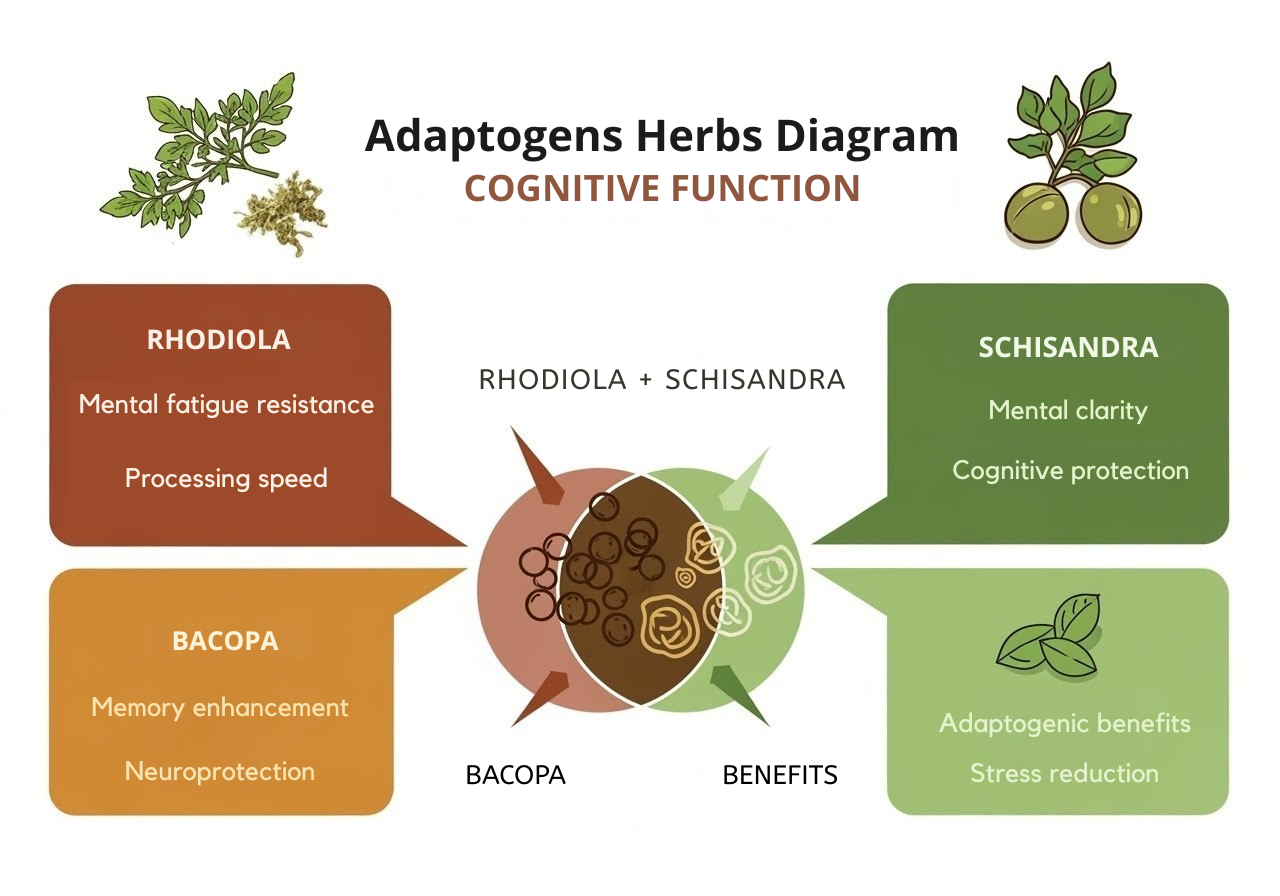
Rhodiola Rosea
Rhodiola rosea demonstrates unique mechanisms for combating mental fatigue and enhancing cognitive resilience under stress. Unlike stimulants that provide temporary energy boosts, Rhodiola appears to optimize stress response systems while supporting sustained cognitive performance during challenging conditions.
Research Highlights (2024):
- Improved reaction times under stress
- Enhanced processing speed
- Better cognitive flexibility
- Dose-dependent benefits observed
Optimal Dosing:
- 200-600mg daily standardized extract
- 3% rosavins, 1% salidroside
- Morning administration preferred
- Benefits within 1-2 weeks
Bacopa Monnieri
Bacopa monnieri’s cognitive benefits have gained substantial research validation, with recent studies confirming its effectiveness for memory enhancement and cognitive processing speed. A comprehensive 2024 analysis demonstrated that Bacopa supplementation can improve overall cognitive performance scores while maintaining excellent safety profiles.
Bacopa’s Multi-Modal Benefits
Memory Enhancement:
- Better memory encoding
- Enhanced consolidation
- Improved retrieval
- Benefits across memory types
Neuroprotection:
- Antioxidant effects
- Anti-inflammatory action
- Supports aging brain
- Long-term cognitive protection
Schisandra Chinensis
Schisandra chinensis represents one of the most underrated adaptogens for cognitive enhancement, with emerging research revealing powerful effects on mental clarity and cognitive protection. Unlike more well-known adaptogens, Schisandra demonstrates unique mechanisms involving liver function optimization and enhanced cellular energy production.
The adaptogen’s cognitive benefits appear linked to its ability to enhance cellular detoxification processes and optimize metabolic function. By supporting liver function and cellular energy production, Schisandra creates optimal conditions for sustained cognitive performance and mental clarity.
Synergistic Compounds – Powerful Combinations for Maximum Results
Principles of Synergy in Natural Nootropics
Natural nootropic synergy operates through complementary mechanisms that amplify individual benefits while minimizing potential limitations. Effective “stacking” involves combining compounds with different but complementary mechanisms of action, creating enhanced cognitive benefits that exceed the sum of individual effects.
Successful synergistic combinations typically include compounds addressing different aspects of cognitive function: energy metabolism, neurotransmitter optimization, neuroplasticity enhancement, and stress response modulation.
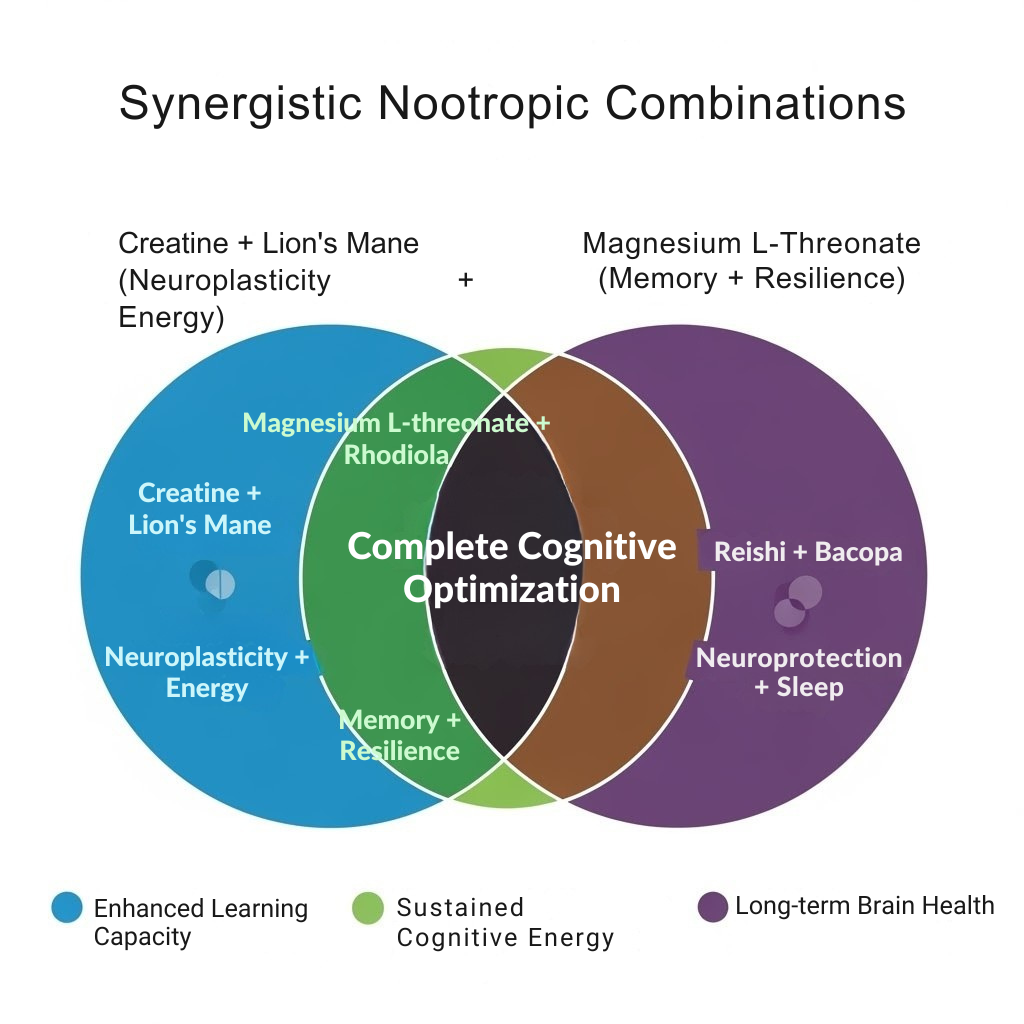
Research-Proven Combinations
Energy + Neuroplasticity
Creatine + Lion’s Mane
Creatine provides energy substrate for enhanced neural activity, while Lion’s Mane promotes growth of new neural connections.
- Enhanced learning capacity
- Sustained mental energy
- Improved neuroplasticity
Memory + Resilience
Magnesium L-threonate + Rhodiola
Magnesium optimizes memory systems while Rhodiola provides stress resistance for consistent performance.
- Enhanced memory formation
- Stress-resistant cognition
- Consistent performance
Neuroprotection + Sleep
Reishi + Bacopa
Reishi enhances sleep quality for restoration while Bacopa optimizes memory processes during sleep.
- Optimized sleep architecture
- Enhanced memory consolidation
- Long-term brain protection
Stacking Protocols for Different Cognitive Objectives
Memory & Learning Stack
- Magnesium L-threonate (2g evening)
- Bacopa monnieri (300mg morning)
- Lion’s Mane (1g daily)
- Timeline: 6-12 weeks for full benefits
Focus & Energy Stack
- Creatine monohydrate (5g morning)
- Rhodiola rosea (400mg morning)
- Moderate caffeine (100mg as needed)
- Timeline: 1-4 weeks for benefits
Clarity & Recovery Stack
- Reishi mushroom (2g evening)
- Magnesium L-threonate (1g evening)
- Schisandra chinensis (500mg morning)
- Timeline: 2-8 weeks for benefits
Practical Considerations and Implementation
Evaluating Supplement Quality
Quality assessment for natural nootropics requires attention to several critical factors: third-party testing for purity and potency, standardization to specific bioactive compounds, and verification of extraction methods used in production.
Quality Indicators to Look For:
- Third-party testing certificates
- Standardized bioactive compounds
- Appropriate extraction methods
- Transparent labeling
- Reputable manufacturer credentials
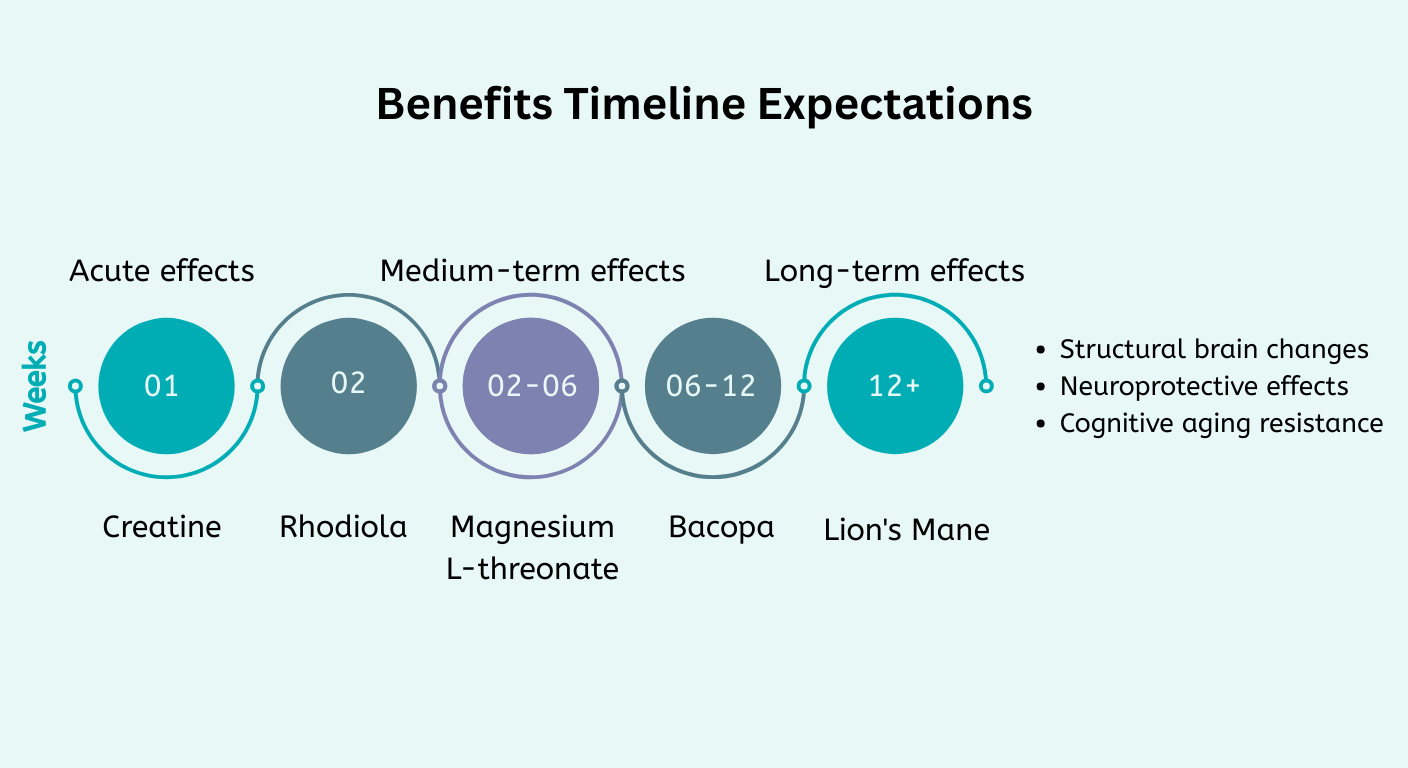
Realistic Timeline Expectations
Acute Effects (1-2 weeks)
- Creatine energy enhancement
- Rhodiola stress resistance
- Magnesium sleep improvement
Medium-term (2-8 weeks)
- Memory enhancement (Bacopa)
- Neuroplasticity (Lion’s Mane)
- Adaptogenic benefits
Long-term (8+ weeks)
- Structural brain changes
- Neuroprotective effects
- Cognitive aging resistance
Special Populations and Precautions
Important Considerations
Age-Related Factors:
- Older adults may need lower doses
- Enhanced sensitivity possible
- Greater benefits often observed
- Slower onset but longer duration
Safety Precautions:
- Check medication interactions
- Consult healthcare providers
- Start with single compounds
- Monitor individual responses
The Future of Natural Nootropics: Trends for 2025-2026
Advances in Extraction and Bioavailability
Emerging extraction technologies are revolutionizing natural nootropic effectiveness through enhanced bioactive compound concentrations and improved bioavailability. Supercritical CO2 extraction, advanced enzyme processing, and fermentation-based enhancement methods are creating more potent and effective natural nootropic formulations.
Nanotechnology applications in natural nootropic delivery are showing promising results for enhanced brain bioavailability. Nanoencapsulation and nanoemulsion technologies may significantly improve the effectiveness of traditionally poorly absorbed natural compounds.

Nootropics market expanding. Source: The Business Research Company
Novel Delivery Methods
Liposomal Systems
Enhanced bioavailability through lipid encapsulation
- Improved absorption rates
- Reduced dosing requirements
- Better tissue targeting
Advanced Delivery
Sublingual and transdermal options
- Faster onset of effects
- Bypassed digestive system
- More consistent absorption
Integration with Cognitive Monitoring Technologies
Wearable cognitive monitoring devices are beginning to enable real-time assessment of nootropic effectiveness, allowing for personalized optimization of natural cognitive enhancement protocols based on individual response patterns.
AI-driven analysis of cognitive performance data may soon enable precise customization of natural nootropic combinations based on individual brain chemistry, genetic factors, and cognitive goals.
Conclusion
The landscape of natural cognitive enhancement has evolved dramatically, with 2025 research revealing compelling evidence for several underrated natural nootropics that offer legitimate, science-backed cognitive benefits. From creatine’s surprising role in brain energy metabolism to Lion’s Mane’s neuroplasticity-enhancing mechanisms, these natural compounds provide viable alternatives to synthetic cognitive enhancers.
Key Takeaways from 2025 Research
- Creatine monohydrate enhances cognitive performance through brain energy optimization
- Lion’s Mane mushroom promotes neuroplasticity via NGF and BDNF stimulation
- Magnesium L-threonate uniquely crosses the blood-brain barrier for memory enhancement
- Rhodiola rosea provides stress-resistant cognitive performance
- Synergistic combinations amplify individual benefits through complementary mechanisms
Evidence-based approaches to cognitive enhancement require patience, consistency, and realistic expectations. The most effective natural nootropics typically provide cumulative benefits that develop over weeks to months, offering sustainable cognitive improvement rather than temporary stimulation.
A holistic approach to cognitive optimization extends beyond supplementation to include proper nutrition, regular exercise, quality sleep, and stress management. Natural nootropics work best when integrated into comprehensive lifestyle approaches that support overall brain health and cognitive function.
Take Action Today
Select one research-validated natural nootropic from this analysis and implement it consistently for 6-8 weeks while monitoring your cognitive response. Start with single compounds before progressing to synergistic combinations.
Remember: Sustainable cognitive enhancement is a journey, not a destination.
FAQ – Frequently Asked Questions
1. What are natural nootropics and how do they work?
Natural nootropics are substances derived from plants, fungi, or natural minerals that enhance cognitive function through various mechanisms including improved brain energy metabolism, neurotransmitter optimization, neuroplasticity enhancement, and neuroprotection. Unlike synthetic stimulants, they work with the brain’s natural systems to provide sustainable cognitive enhancement.
2. Which natural nootropics are most effective in 2025 based on research?
The most research-validated natural nootropics in 2025 include creatine monohydrate for brain energy and memory, Lion’s Mane mushroom for neuroplasticity and cognitive function, magnesium L-threonate for memory and sleep quality, Rhodiola rosea for mental fatigue resistance, and Bacopa monnieri for memory enhancement and processing speed.
3. How can creatine improve brain function beyond muscular benefits?
Creatine enhances brain function by providing rapid energy regeneration through the creatine-phosphocreatine system, increasing brain ATP availability, improving cognitive performance during mental fatigue, and supporting optimal neural energy metabolism. 2024 research shows it’s particularly effective for maintaining cognitive function during sleep deprivation and high mental demand.
4. Which medicinal mushrooms have the best cognitive benefits?
Lion’s Mane (Hericium erinaceus) shows the strongest evidence for cognitive enhancement through NGF and BDNF stimulation, promoting neuroplasticity and memory formation. Reishi (Ganoderma lucidum) provides cognitive benefits through improved sleep quality and reduced neuroinflammation, while Cordyceps may enhance mental energy and cognitive endurance.
5. How does magnesium L-threonate differ from other magnesium forms for brain health?
Magnesium L-threonate is uniquely designed to cross the blood-brain barrier effectively, increasing brain magnesium levels by 15-20% compared to minimal increases from other forms. This enhanced bioavailability translates into superior benefits for memory, learning, synaptic plasticity, and sleep quality compared to conventional magnesium supplements.
6. What’s the best combination of natural nootropics for memory and focus?
Research-supported combinations include magnesium L-threonate with Bacopa monnieri for memory enhancement, creatine with Lion’s Mane for energy and neuroplasticity, and Rhodiola with magnesium L-threonate for focus and stress resistance. Start with individual compounds before progressing to combinations.
7. How long does it take to see results with natural cognitive supplements?
Timeline varies by compound: creatine and Rhodiola may show benefits within 1-2 weeks, magnesium L-threonate effects often appear within 2-4 weeks, while Lion’s Mane and Bacopa typically require 6-12 weeks for optimal benefits. Consistency is crucial for achieving meaningful cognitive enhancement.
8. What are the signs of a quality nootropic supplement?
Quality indicators include third-party testing for purity and potency, standardization to specific bioactive compounds, appropriate extraction methods (dual-extraction for mushrooms), certificates of analysis availability, reputable manufacturer credentials, and transparent labeling of exact compound concentrations.
References
Key Scientific Studies (2023-2025)
1. Xu, C., Bi, S., Zhang, W., & Luo, L. (2024). The effects of creatine supplementation on cognitive function in adults: a systematic review and meta-analysis. Frontiers in Nutrition, 11, 1424972. https://www.frontiersin.org/journals/nutrition/articles/10.3389/fnut.2024.1424972/full
2. Gordji-Nejad, A., Matusch, A., Kleedörfer, S., et al. (2024). Single dose creatine improves cognitive performance and induces changes in cerebral high energy phosphates during sleep deprivation. Scientific Reports, 14, 54249. https://www.nature.com/articles/s41598-024-54249-9
3. Effects of erinacine A-enriched Hericium erinaceus supplementation on cognitive function. (2024). Science Direct, Article in Press. https://www.sciencedirect.com/science/article/pii/S1756464624001221
4. The acute and chronic effects of Lion’s Mane mushroom supplementation on cognitive function, mood and inflammation. (2024). PMC, 10675414. https://pmc.ncbi.nlm.nih.gov/articles/PMC10675414/
5. Magnesium-L-threonate improves sleep quality and daytime cognitive function. (2024). Science Direct, S2590142724000193. https://www.sciencedirect.com/science/article/pii/S2590142724000193
6. The effectiveness of Rhodiola rosea L. preparations in alleviating various aspects of life-stress symptoms and stress-induced conditions. (2022). PMC, 9228580. https://pmc.ncbi.nlm.nih.gov/articles/PMC9228580/
7. Evaluating the effects of Bacopa monnieri on cognitive performance. (2024). Science Direct, S1550830724000533. https://www.sciencedirect.com/science/article/pii/S1550830724000533
8. EFSA Panel evaluation: Creatine and improvement in cognitive function. (2024). EFSA Journal, 9100. https://efsa.onlinelibrary.wiley.com/doi/abs/10.2903/j.efsa.2024.9100
Market Analysis Sources
• Global Nootropics Market Report 2025, The Business Research Company
• U.S. Nootropics Market Analysis 2025-2030, Grand View Research
• Nootropic Supplement Market Trends 2025-2035, Future Market Insights

